The Winter Solstice

I don’t like Christmas very much (I’m a mean one, I guess), but I certainly have learned to dig the winter solstice.
While plenty of good folks are campaigning to “keep the Christ in Christmas,” a pursuit I happen to think is actually a worthy one on its own terms, it seems that not as many realize that, long before anyone had ever heard of Jesus Christ, the astronomical/-logical event known as the winter solstice already played a starring role in human civilization. Were this not the case, Christians might very likely celebrate the birth of their savior in March, May, or just whenever.
So Jesus isn’t the only reason for the season. Far from it. Give me that, and we’ll be okay forever and ever.
What is the winter solstice?
The winter solstice can be defined celestially as the point at which the Sun appears at the greatest distance on the other side of the equatorial plane from the observer. In the northern hemisphere, it is the instant at which the sun could be said to ‘stand still’ (Lat. sol “Sun” + sistere “to be still”) at its southernmost point in the sky before beginning the return track northward towards summer. This happens sometime between December 20-23 in the northern hemisphere, and between June 20-23 in the southern hemisphere. Reverse those dates, and you have the dates of the opposite phenomenon, the summer solstice, for each hemisphere.
The cause of the solstices is that, at the instant of solstice, one hemisphere of the Earth is at its maximum tilt away from the Sun. This is why the day of the winter solstice is the shortest, in terms of daylight, of all the days of the year (again, from the perspective of those in the North—it naturally marks the longest day in the South).
Why is it culturally significant?
Because people didn’t always have supermarkets and refrigerators. These are, in fact, extremely recent developments!
In the cultures of the northern hemisphere, the winter solstice marks the onset of ‘deep winter.’ In primitive societies, particularly hunter-gatherer and early agrarian societies which had not yet developed means of harvesting and storing surplus food, it was not always a given that a community would survive through the winter. Cattle were slaughtered at about the time of the solstice so that they would not have to be fed through the winter, creating a temporary supply of fresh meat—this is why we associate winter holidays such as Thanksgiving and Christmas with feasting.
 Aside from such practical concerns, the winter solstice was ceremonially important as an astrological event of spiritual/ritual significance. On the night of the solstice, the stars of Orion’s belt form a line with Sirius, the ‘Dog Star,’ which points to the exact spot where the Sun will rise the following morning. This fact was well-known to the skywatching ancients; important Celtic religious sites such as Stonehenge and New Grange are obviously aligned with the solstice sunrise or sunset, and we see similar reverence for the solstice in even completely unrelated cultures, such as those of neolithic Mesoamerica.
Aside from such practical concerns, the winter solstice was ceremonially important as an astrological event of spiritual/ritual significance. On the night of the solstice, the stars of Orion’s belt form a line with Sirius, the ‘Dog Star,’ which points to the exact spot where the Sun will rise the following morning. This fact was well-known to the skywatching ancients; important Celtic religious sites such as Stonehenge and New Grange are obviously aligned with the solstice sunrise or sunset, and we see similar reverence for the solstice in even completely unrelated cultures, such as those of neolithic Mesoamerica.
Symbolically, because the winter solstice marks the point at which the Sun reverses course and begins to climb back toward its summer posture, it was associated with the concept of spiritual renewal and with the birth dates of certain Sun deities, such as the Roman god Sol and the Persian god Mithras. According to many scholars, this is both why the birth of Jesus, the son (read: “Sun”) of God, is celebrated near the winter solstice, and why the Western New Year falls just behind it.
The winter solstice is culturally significant in and of itself even today because of the effects of deep winter on the minds and lifestyles of people in the more extreme latitudes. Winter is a dark, cold time in which people tend to spend more time indoors, are generally somewhat more sedate, and can sometimes even suffer seasonal depression—although it should be noted that many others claim the winter months as their favorite time of year (most of them own ski passes, no doubt). Having a celebration of feasting and communal fellowship to look forward to is a nice way to add spark and charm to a bleak season.
What is the relationship of the winter solstice to Christmas?
December 25 was the date of the winter solstice on the old Julian calendar; this date was known as Dies natalis Sol invictus (“Birthday of the Unconquered Sun”) in Rome, and conveniently allowed people in various parts of the Roman Empire to celebrate the birth of their sundry Sun deities together. In Rome itself, the solstice marked approximately the end of the festival of Saturnalia, during which masters and slaves swapped roles for a time, there was much feasting and licentious merry-making, and the giving of gifts and alms was encouraged. Aside from the obvious similarities between the “Birthday of the Unconquered Sun” and the “Birthday of the Unconquered Son,” meaning Christ, the Christian celebration of the Nativity very likely inherited the tradition of “merry” gift-giving from Saturnalia.
 We know that, as late as the 3rd Century A.D., at least some Coptic Christians in Egypt celebrated the Nativity in May. The earliest known reference to a Nativity feast corresponding to the winter solstice comes from an illuminated Roman manuscript dated from 354 A.D., although, at least through the early Middle Ages, the celebration of the Nativity in and of itself was not usually distinguished from the early January celebration of the Epiphany.
We know that, as late as the 3rd Century A.D., at least some Coptic Christians in Egypt celebrated the Nativity in May. The earliest known reference to a Nativity feast corresponding to the winter solstice comes from an illuminated Roman manuscript dated from 354 A.D., although, at least through the early Middle Ages, the celebration of the Nativity in and of itself was not usually distinguished from the early January celebration of the Epiphany.
Many of the traditions of Christmas were undoubtedly incorporated through the assimilation of other cultures into the Roman Empire. We have already mentioned that Saturnalia likely passed certain traditions into the Christmas holiday; the Germanic winter solstice festival of Jul (Yule), marked by feasting, decorating with greenery and candlelight, visits from a gift-giving demigod, and the burning of the infamous Yule Log, made a particularly strong imprint on Christmas traditions both because the Germans were the last major culture in the Empire to be christianized, and because Christmas as a holiday first became popular in Western and Northern Europe at approximately the time of Charlemagne, who was crowned on Christmas Day of 800 A.D.
It was not until about this time that Christmas became the major Christian observance of the Nativity, and this was a development that was later challenged throughout Christianity. Early American Puritans particularly disapproved of Christmas, and ever since, there have been religious movements, especially in North America, which have sought to disentangle Christmas from its primarily non-Christian origins and heritage.
What are some other winter solstice celebrations around the world?
A small sampling:
- Wayeb (Maya) – the five unnamed days completing the end of the Maya solar calendar, thought to be an ominous and unlucky time in which divisions between the mortal and immortal worlds were partially broken. People often avoided leaving their houses during this period.
- Amaterasu (Japan) – in ancient Japan, the winter solstice was celebrated as the reemergence of Amaterasu, the sun goddess, from her hibernation in a cave. The celebrations were marked by observances for the dead and theatrical performances, among other events.
- Yalda (Persia) – dating from as long ago as the 2nd millennium BCE, this Persian festival originally marked the birth of the Sun-god Mithras. It is roughly synonymous with the modern Shabe Celle, associated with socializing and feasting on nuts and dried fruits.
- Şeva Zistanê (Kurdish) – this winter solstice observance dates to ancient times and is marked by feasting and the giving of sweets to children, similar in nature to Halloween in America.
- Beiwe (Saami) – the Saami, the indigenous people of northern Scandinavia, have worshipped this goddess of the Sun and of fertility since antiquity. On the night of the winter solstice, many Saami would sacrifice white female animals and paint their doorways with butter for Beiwe to eat, nourishing her for her return from the solstice to the heights of the summer skies.
Also note:
- The Jewish holiday of Chanukah is not specifically related to the winter solstice, although it roughly coincides with it. However, because Chanukah is a celebration of the rededication of a holy temple (similar to Saturnalia), it may be associated de facto with the more ancient traditions of the midwinter feast.
I hope to have amply shown than, while Jesus may be the reason for Christmas proper, He is not the only reason for our celebrations of the winter solstice. The winter solstice is of a deep, broad, and ancient significance which touches on biology, ecology, psychology, sociology, astronomy—practically all aspects of human existence—and has been interpreted in many ways by many cultures.
So, by all means, put the Christ back in Christmas. Just remember that ‘Happy Holidays’ is far more warm, welcoming, and inclusive.
Happy holidays!
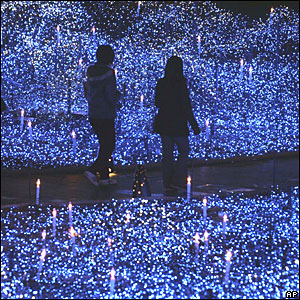
Curt’s Christmas Classics, Vol. 1, or ‘A Philosopher’s Manifesto’
 Happy holidays to everyone. I hope each of you who celebrate Christmas for any and all reasons is having a marvelous holiday filled with family, friends, and introspection. Let us all remember that there are a great many people around the planet who will not be having Merry Christmases this year, and that, in most cases, there are decisive reasons why this is so.
Happy holidays to everyone. I hope each of you who celebrate Christmas for any and all reasons is having a marvelous holiday filled with family, friends, and introspection. Let us all remember that there are a great many people around the planet who will not be having Merry Christmases this year, and that, in most cases, there are decisive reasons why this is so.
Introspection. This year, on Christmas afternoon, I decided to re-publish a piece of literature which first appeared in the journal Ethics in 1968. Written by A. Noam Chomsky, it is entitled “Philosophers and Public Philosophy.” There are certain people, to be sure, who will look upon this choice of article as the oblivious pettifoggery of a hopeless hippie liberal–and these are folks who would benefit little, if any, from these extraordinarily wise and still extremely applicable words, so the loss is minimal in any case. But for the discerning patriot and the anarchist thinker alike, Chomsky’s words will still ring largely as true as they did very nearly forty years ago. And so we commence.
PHILOSOPHERS AND PUBLIC PHILOSOPHY
Noam Chomsky
Ethics, Vol. 79 Number 1, October 1968
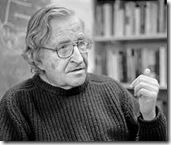 For a number of reasons, I have found it extraordinarily difficult to write about this topic. Perhaps it would help set the stage for a discussion if I were to begin by mentioning some of these, even though to do so, I will have to digress somewhat. The first problem is that I am approaching the topic of the symposium from several premises which themselves require argument and justification, although this is not the place to elaborate them. My response to this topic must naturally be based upon a certain interpretation of the context in which questions of public policy arise in the United States at this particular historical moment, an interpretation which obviously cannot fail to be controversial but which, within the framework of this symposium, I cannot develop but can only formulate as a basis for my own discussion of the topic. One premise is that the country faces a serious crisis and that, because of our international role, our crisis is a world crisis as well. Increasingly, the United States has become both the agent of repression and—to use Howard Zinn’s phrase—“the white-gloved financier of counter-revolution” throughout the world. It is, by any objective standard I can imagine, the most aggressive country in the world, the greatest threat to world peace, and without parallel as a source of violence. In part, this violence is quite overt—I need say little about our behavior in Vietnam. In part it is more subtle, the violence of the status quo, the muted endless terror that we have imposed on vast areas that are under our control or susceptible to our influence. Americans are no more likely to accept such a judgment than were citizens of Japan or Germany thirty years ago. However, an objective analysis seems to me to permit no other evaluation. If we consider governments maintained in power by force or overthrown through subversion or intrigue, or the willingness to use the most awesome killing machine in history to enforce our rule, or the means employed—saturation bombing, free-strike zones, napalm and anti-personnel weapons, chemical warfare—there seems to me no other conclusion: we are simply without rival today as an agent of international criminal violence.
For a number of reasons, I have found it extraordinarily difficult to write about this topic. Perhaps it would help set the stage for a discussion if I were to begin by mentioning some of these, even though to do so, I will have to digress somewhat. The first problem is that I am approaching the topic of the symposium from several premises which themselves require argument and justification, although this is not the place to elaborate them. My response to this topic must naturally be based upon a certain interpretation of the context in which questions of public policy arise in the United States at this particular historical moment, an interpretation which obviously cannot fail to be controversial but which, within the framework of this symposium, I cannot develop but can only formulate as a basis for my own discussion of the topic. One premise is that the country faces a serious crisis and that, because of our international role, our crisis is a world crisis as well. Increasingly, the United States has become both the agent of repression and—to use Howard Zinn’s phrase—“the white-gloved financier of counter-revolution” throughout the world. It is, by any objective standard I can imagine, the most aggressive country in the world, the greatest threat to world peace, and without parallel as a source of violence. In part, this violence is quite overt—I need say little about our behavior in Vietnam. In part it is more subtle, the violence of the status quo, the muted endless terror that we have imposed on vast areas that are under our control or susceptible to our influence. Americans are no more likely to accept such a judgment than were citizens of Japan or Germany thirty years ago. However, an objective analysis seems to me to permit no other evaluation. If we consider governments maintained in power by force or overthrown through subversion or intrigue, or the willingness to use the most awesome killing machine in history to enforce our rule, or the means employed—saturation bombing, free-strike zones, napalm and anti-personnel weapons, chemical warfare—there seems to me no other conclusion: we are simply without rival today as an agent of international criminal violence.
There is, furthermore, a serious domestic crisis. Again, I need not speak of the problems of racism and poverty, which are all too obvious. What deserves some comment, however, is the callousness with which we react to the misery we impose. This is perhaps most evident in the growing opposition to the war in Vietnam. It is no secret to anyone that the war is highly unpopular. It is also no secret that the opposition to the war is based primarily on its cost. It is a “pragmatic opposition,” motivated by calculations of cost and utility. Many of those who are now most vociferous in expressing their opposition to the war announce—in fact proclaim—that their opposition would cease if our effort to control and organize Vietnamese society were to prove successful. In that case, in the words of one such spokesman, we would “all be saluting the wisdom and statesmanship of the American government” (Arthur Schlesinger), even though, as he is the first to point out, we are turning Vietnam into “a land of ruin and wreck.” This pragmatic opposition holds that we should “take our stand” where the prospects for success are greater, that Vietnam is a lost cause, and, for this reason, that our efforts there should be modified or abandoned.
I do not want to debate the issue here but only to formulate a second premise from which my discussion of the topic of this meeting will begin: namely, that this quite pervasive pragmatic attitude toward the war in Vietnam is a sign of moral degeneration so severe that talk of using the normal channels of protest and dissent becomes meaningless and that various forms of resistance provide the most significant course of political action open to a concerned citizen.
Nothing supports this judgment more clearly, in my opinion, than the recent change in the domestic political climate, dramatized by the President’s announcement that he will not seek reelection. The political commentators would have it that this event demonstrates that our political system is, after all, healthy and functioning. Confronted with the collapse of its war plans, an international economic crisis, and threatening internal conflicts, the Administration has, in effect, resigned—to put it in parliamentary terms. This shows the health of our democratic system. By such standards, an even more viable democratic system was that of Fascist Japan thirty years ago, where more than a dozen cabinets fell under not-dissimilar circumstances. What would have demonstrated the health of our system would have been a change of policy based on the realization that the policy was wrong, not that it was failing—a realization that success in such a policy would have been a tragedy. Nothing could be more remote from the American political consciousness. It is held, rather, that it is the peculiar genius of the American politics of accommodation to exclude moral considerations. How natural, then, and how good that only pragmatic considerations of cost and utility should determine whether we devastate another country, drive its people from their villages, and carry out experiments with “material and human resources control” that so delight the “pacification theorist.”
 Three times in a generation American technology has laid waste a helpless Asian country. This fact should be seared into the consciousness of every American. A person who is not obsessed with this realization is living in a world of fantasy. But we have not, as a nation, learned to face this central fact of contemporary history. The systematic destruction of a virtually defenseless Japan was carried out with a moral rectitude that was then, and remains today, unchallenged—or nearly so. In fact, Secretary of War Henry Stimson said at the time that there was something wrong with a nation that could listen with such equanimity to the reports of the terror bombing of Japanese cities. There were few voices to echo his doubts—which were expressed before the two atom bombs, before the grand finale requested by General Arnold and approved in Washington, a one thousand plane raid on central Japan launched after the surrender had been announced but before it had been officially received, a raid in which, according to the report of the victims, the bombs were interspersed with leaflets announcing that Japan had surrendered. In Korea, the process was repeated, with only a few qualms. It is the amazing resistance of the Vietnamese that has forced us to ask: What have we done? There is little doubt that, were this resistance to collapse, the domestic furor over the war would disappear along with it.
Three times in a generation American technology has laid waste a helpless Asian country. This fact should be seared into the consciousness of every American. A person who is not obsessed with this realization is living in a world of fantasy. But we have not, as a nation, learned to face this central fact of contemporary history. The systematic destruction of a virtually defenseless Japan was carried out with a moral rectitude that was then, and remains today, unchallenged—or nearly so. In fact, Secretary of War Henry Stimson said at the time that there was something wrong with a nation that could listen with such equanimity to the reports of the terror bombing of Japanese cities. There were few voices to echo his doubts—which were expressed before the two atom bombs, before the grand finale requested by General Arnold and approved in Washington, a one thousand plane raid on central Japan launched after the surrender had been announced but before it had been officially received, a raid in which, according to the report of the victims, the bombs were interspersed with leaflets announcing that Japan had surrendered. In Korea, the process was repeated, with only a few qualms. It is the amazing resistance of the Vietnamese that has forced us to ask: What have we done? There is little doubt that, were this resistance to collapse, the domestic furor over the war would disappear along with it.
Such facts as these—and endless details can all too easily be supplied—raise the question whether what is needed in the United States today is dissent or denazification. The question is a debatable one. Reasonable men may differ. The fact that the question is even debatable is a tragedy. I believe myself that what is needed is a kind of denazification. There is, of course, no more powerful force that can call us to account. The change will have to come from within. The fate of millions of poor and oppressed people throughout the world will be determined by our ability to carry out a profound “cultural revolution” in the United States.
 It might be argued that it is naïve to discuss political and moral consciousness as if they were other than a surface manifestation of social institutions and the power structure and that, no matter what individual Americans may think and feel and believe, the American system will continue to try to dominate the earth by force. The inductive argument for the latter thesis is substantial. The Vietnam War is hardly without precedent in our history. It is, for example, distressingly like our colonial venture in the Philippines seventy years ago. What is more, it is remarkably similar to other episodes in the history of colonialism, for example, the Japanese attempt to defend the independence of Manchukuo from the “Communist threat” posed by Russia and the “Chinese bandits.” Nevertheless, it is difficult to believe that American society will collapse from its own “internal contradictions” if it does not proceed to dominate the world. The belief that “the American system could survive in America only if it became a world system”—to quote President Truman in 1947—has, indeed, guided our international policy for many years, as has the belief, enunciated by liberal and conservative alike, that access to ever expanding markets and opportunities for investment is necessary for the survival of the American Way of Life. There is, no doubt, a large component of myth in ideology. In any event, the question is somewhat academic. Whether we aim for reform or revolution, the early steps must be the same: an attempt to modify political and moral consciousness and to construct alternative institutional forms that reflect and support this development. Personally, I believe that our present crisis is in some measure, moral or intellectual rather than institutional and that reason and resistance can go a certain way, perhaps a long way, toward ameliorating it.
It might be argued that it is naïve to discuss political and moral consciousness as if they were other than a surface manifestation of social institutions and the power structure and that, no matter what individual Americans may think and feel and believe, the American system will continue to try to dominate the earth by force. The inductive argument for the latter thesis is substantial. The Vietnam War is hardly without precedent in our history. It is, for example, distressingly like our colonial venture in the Philippines seventy years ago. What is more, it is remarkably similar to other episodes in the history of colonialism, for example, the Japanese attempt to defend the independence of Manchukuo from the “Communist threat” posed by Russia and the “Chinese bandits.” Nevertheless, it is difficult to believe that American society will collapse from its own “internal contradictions” if it does not proceed to dominate the world. The belief that “the American system could survive in America only if it became a world system”—to quote President Truman in 1947—has, indeed, guided our international policy for many years, as has the belief, enunciated by liberal and conservative alike, that access to ever expanding markets and opportunities for investment is necessary for the survival of the American Way of Life. There is, no doubt, a large component of myth in ideology. In any event, the question is somewhat academic. Whether we aim for reform or revolution, the early steps must be the same: an attempt to modify political and moral consciousness and to construct alternative institutional forms that reflect and support this development. Personally, I believe that our present crisis is in some measure, moral or intellectual rather than institutional and that reason and resistance can go a certain way, perhaps a long way, toward ameliorating it.
 Considerations such as these—which I have not tried to justify but only to formulate—seem to me to provide the framework within which an American should ask himself what is his responsibility as a citizen. About this question there is a great deal to be said, and still more to be done. It is not, however, the question to which this session is addressed, and this is the central fact that causes my difficulty, noted at the outset, in trying to discuss the narrower topic of philosophers and public policy. At a time when we are waging a war of indescribable savagery against Vietnam—in the interests of the Vietnamese, of course, just as the Japanese were merely trying to create an earthly paradise in Manchukuo—at a time when we are preparing for and in part already conducting other “limited wars” at home and abroad, at a time when thousands of young men, many of them our students, are facing jail or political exile because of their conscientious refusal to be agents of criminal violence, at a time when we are once again edging the world toward nuclear war, at such a time it is difficult to restrict oneself to the narrower question: What is one’s responsibility as a philosopher? Nevertheless, I will try to do so.
Considerations such as these—which I have not tried to justify but only to formulate—seem to me to provide the framework within which an American should ask himself what is his responsibility as a citizen. About this question there is a great deal to be said, and still more to be done. It is not, however, the question to which this session is addressed, and this is the central fact that causes my difficulty, noted at the outset, in trying to discuss the narrower topic of philosophers and public policy. At a time when we are waging a war of indescribable savagery against Vietnam—in the interests of the Vietnamese, of course, just as the Japanese were merely trying to create an earthly paradise in Manchukuo—at a time when we are preparing for and in part already conducting other “limited wars” at home and abroad, at a time when thousands of young men, many of them our students, are facing jail or political exile because of their conscientious refusal to be agents of criminal violence, at a time when we are once again edging the world toward nuclear war, at such a time it is difficult to restrict oneself to the narrower question: What is one’s responsibility as a philosopher? Nevertheless, I will try to do so.
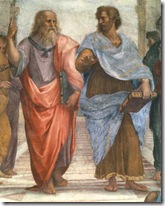 I think it is possible to construct a reasonable argument to the effect that one has no particular responsibility, as a philosopher, to take a stand on questions of public policy, whatever one’s duties may be as a citizen. The argument might proceed as follows. To hold that philosophers have some special responsibility in this regard suggests that they have some unique competence to deal with the problems we face or that others—say biologists or mathematicians—are somehow more free to put these problems aside. But neither conclusion is correct. There is no specific competence that one attains through his professional training as a philosopher to deal with the problems of international or domestic repression, or, in general, with critique and implementation of public policy. Similarly, it is absurd to claim that biologists or mathematicians may freely dismiss these problems on the grounds that others have the technical expertise and moral responsibility to confront them. As a professional, one has only the duty of doing his work with integrity. Integrity, both personal and scholarly, demands that we face the questions that arise internally in some particular domain of study, that are on the border of research, and that promise to move the search for truth and understanding forward. It would be a sacrifice of such integrity to allow external factors to determine the course of research. This would represent a kind of “subversion of scholarship.” The most meaningful contribution that an individual can make toward a more decent society is to base his life’s work on an authentic commitment to important values, such as those that underlie serious scholarly or scientific work, in any field. But this demands that, as a professional, he stick to his last.
I think it is possible to construct a reasonable argument to the effect that one has no particular responsibility, as a philosopher, to take a stand on questions of public policy, whatever one’s duties may be as a citizen. The argument might proceed as follows. To hold that philosophers have some special responsibility in this regard suggests that they have some unique competence to deal with the problems we face or that others—say biologists or mathematicians—are somehow more free to put these problems aside. But neither conclusion is correct. There is no specific competence that one attains through his professional training as a philosopher to deal with the problems of international or domestic repression, or, in general, with critique and implementation of public policy. Similarly, it is absurd to claim that biologists or mathematicians may freely dismiss these problems on the grounds that others have the technical expertise and moral responsibility to confront them. As a professional, one has only the duty of doing his work with integrity. Integrity, both personal and scholarly, demands that we face the questions that arise internally in some particular domain of study, that are on the border of research, and that promise to move the search for truth and understanding forward. It would be a sacrifice of such integrity to allow external factors to determine the course of research. This would represent a kind of “subversion of scholarship.” The most meaningful contribution that an individual can make toward a more decent society is to base his life’s work on an authentic commitment to important values, such as those that underlie serious scholarly or scientific work, in any field. But this demands that, as a professional, he stick to his last.
I think the argument has a good deal of force. I do not doubt that those who pursued their work at the Goethe Institute, in the shadow of Dachau, justified themselves by such considerations as these. Two or three years ago, I would have accepted this line of argument as correct, and it still seems to be persuasive.
There is, of course, an apparent counter-argument: namely, that in a time of crisis one should abandon, or at least restrict, professional concerns and activities that do not adapt themselves in a natural way toward the resolution of this crisis. This argument is actually consistent with the first; and it can, I think, be maintained that this is all there is to the matter.
I think that for many professionals this may well be all that there is to the matter. I do not, for example, see any way to make my work as a linguist relevant, in any serious sense, to the problems of domestic or international society. The only relevance is remote and indirect, through the insight that such work might provide into the nature of human intelligence. But to accept that connection as “relevance” would be hypocrisy. The only solution I can see, in this case, is a schizophrenic existence, which seems to me morally obligatory and not at all impossible, in practice.
Philosophers, however, may be in a somewhat more fortunate position. There is no profession that can claim with greater authenticity that its concern is the intellectual culture of the society or that it possesses the tools for the analysis of ideology and the critique of social knowledge and its use. If it is correct to regard the American and world crisis as in part a cultural one, then philosophical analysis may have a definite contribution to make. Let me consider a few cases in point.

Our society stands in awe of “technical expertise” and gives great prestige and considerable latitude of action to the person who lays claim to it. In fact, it is widely mentioned that we are becoming the first “post-industrial society,” a society in which the dominant figure will be not the entrepreneur but the technical expert or even the scientist, those who create and apply the knowledge that is, for the first time in history, the major motive force for social progress. According to this view, the university and the research institution will be the “creative eye,” the central institutions of this new society, and the academic specialist will be the “new man” whose values will be come dominant and who will himself be at or near the center of power.
There are many who look forward to this prospect with great hope. I am not one of them. It seems to me a prospect that is not appealing and that has many dangers. For one thing, the assumption that the state can be the source of effective social action is highly dubious. Furthermore, what reason is there to believe that those whose claim to power is based on knowledge and technique—or at least the claim to knowledge and technique—will be more humane and just in the exercise of power than those whose claim is based on wealth or aristocratic privilege? On the contrary, one might expect such a person to be arrogant, inflexible, incapable of admitting or adjusting to failure, since failure undermines his claim to power. To take just the most obvious instance, consider the Vietnam War, which was in large measure designed by the new breed of “action intellectuals” and which manifests all of these characteristics.
What is more, it is natural to expect that any group with access to power will construct an ideology that justifies its dominance on grounds of the general welfare. When it is the intelligentsia who aspire to power, the danger is even greater than before, since they can capitalize on the prestige of science and technology while, at the same time, now drawn into the mechanism of control, they lose their role as social critics. Perhaps the most important role of the intellectual since the enlightenment has been that of unmasking ideology, exposing the injustice and repression that exists in every society that we know, and seeking the way to a new and higher form of social life that will extend the possibilities for a free and creative life. We can confidently expect this role to be abandoned as the intellectual becomes the administrator of a new society.
These observations are hardly novel. I am simply paraphrasing a classical anarchist critique, of which typical expressions are the following:
Commenting on Marxian doctrine, Bakunin had this to say:
According to the theory of Mr. Marx, the people must not only destroy [the state] but must strengthen it and place it at the complete disposal of their benefactors, guardians, and teachers—the leaders of the Communist party, namely Mr. Marx and his friends, who will proceed to liberate [mankind] in their own way. They will concentrate the reins of government in a strong hand, because the ignorant people require an exceedingly firm guardianship; they will establish a single state bank, concentrating in its hands all commercial, industrial, agricultural, and even scientific production, and then divide the masses into two armies—under the direct command of the state engineers, who will constitute a new privileged scientific-political estate.
Or compare the more general remarks by the anarchist historian Rudolph Rocker:
Political rights do not originate in parliaments; they are rather forced upon them from without. And even their enactment into law has for a long time been no guarantee of their security. They do not exist because they have been legally set down on a piece of paper, but only when they have become the ingrown habit of a people, and when any attempt to impair them will meet with the violent resistance of the populace. When this is not the case, there is no help in any parliamentary opposition to Platonic appeals to the constitution. One compels respect from others when one knows how to defend one’s dignity as a human being. This is not only true in private life; it has always been the same in political life as well.
History has shown the accuracy of this analysis, both with respect to the role of an intellectual elite and with respect to the nature of political rights, whoever may rule. I see little reason to expect the future to show otherwise.
If it is true that the new, “post-industrial” society will be marked by the access to power of an intellectual elite, basing its claim to power on a presumably “value free” technology of social management, then the importance of the social critic becomes more crucial than ever before. This critic must be capable of analyzing the content of the claimed “expertise,” its empirical justification, and its social use. These are typical questions of philosophy. The same analytical approach that seeks to explore the nature of scientific theories in general or the structure of some particular domain of knowledge or to investigate the concept of a human action can be turned to the study of technology of control and manipulation that goes under the name of “behavioral science” and that serves as the basis for the ideology of the “new mandarins.” Furthermore, this task will be of greater human significance, for the foreseeable future, than the investigation of the foundations of physics or the possibility of reducing mental states to brain states—questions that I do not, incidentally, mean to disparage—I hope that is clear.
 I think it would be important for the university to provide the framework for critical work of this sort. The matter goes well beyond politics in a narrow sense. There are inherent dangers in professionalization that are not sufficiently recognized in university structure. There is a tendency, as a field becomes truly professionalized, for its problems to be determined less by considerations of intrinsic interest and more by the availability of certain tools that have been developed as the subject matures. Philosophy is not free from this tendency, of course. In part, this is of course not only unavoidable but even essential for scientific progress. But it is important to find a way, in teaching even more than in research, to place the work that is feasible and productive at a certain moment against the background of the general concerns that make some questions, but not some others, worth pursuing. It is easy to give examples to show how certain fields have been seriously distorted by a failure to maintain this perspective. For example, I think it is possible to show that certain simple and very useful experimental ideas in the psychology of learning have for many psychologists taken on the status of conditions that define the subject matter of learning theory, much to the detriment of the field, in the long run. I think that in most academic fields a graduate student would benefit greatly from the experience, rarely offered in any academic program, of defending the significance of the field of work in which he is engaged and facing the challenge of a point of view and a critique that does not automatically accept the premises and limitations of scope that are to be found in any discipline. I am putting this too abstractly, but I think the point is clear, and I think that it indicates a defect of much of university education.
I think it would be important for the university to provide the framework for critical work of this sort. The matter goes well beyond politics in a narrow sense. There are inherent dangers in professionalization that are not sufficiently recognized in university structure. There is a tendency, as a field becomes truly professionalized, for its problems to be determined less by considerations of intrinsic interest and more by the availability of certain tools that have been developed as the subject matures. Philosophy is not free from this tendency, of course. In part, this is of course not only unavoidable but even essential for scientific progress. But it is important to find a way, in teaching even more than in research, to place the work that is feasible and productive at a certain moment against the background of the general concerns that make some questions, but not some others, worth pursuing. It is easy to give examples to show how certain fields have been seriously distorted by a failure to maintain this perspective. For example, I think it is possible to show that certain simple and very useful experimental ideas in the psychology of learning have for many psychologists taken on the status of conditions that define the subject matter of learning theory, much to the detriment of the field, in the long run. I think that in most academic fields a graduate student would benefit greatly from the experience, rarely offered in any academic program, of defending the significance of the field of work in which he is engaged and facing the challenge of a point of view and a critique that does not automatically accept the premises and limitations of scope that are to be found in any discipline. I am putting this too abstractly, but I think the point is clear, and I think that it indicates a defect of much of university education.
In the specific case of social and behavioral science in a “post-industrial society” with the university as a central institution of innovation and authority, the defect may become a disaster. To put it succinctly, the university requires a conscience, free from the controls that are implicit in any association with the organs of power, from any role in the formation and implementation of public policy. I think that any serious university should be thinking about how it might institute a program of radical social inquiry that would examine the premises of public policy and attempt a critical analysis of the prevailing ideology. Ideally, such a program should, perhaps, not even have a separate faculty associated with it but should, rather, seek to involve as wide a segment of the university community as possible in far-reaching social criticism. A program of this sort would be a natural and valuable outgrowth of the philosopher’s concern for conceptual analysis.
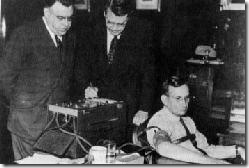 Again, I would like to stress that the issue is not one of politics in a narrow sense. I think that the applications of behavioral science in education or therapy, to mention just two examples, are as much in need of critical analysis as the applications to counterinsurgency. And the assumptions and values that lie behind the poverty program or urban renewal deserve the same serious analysis as those that lie behind the manipulative diplomacy of the postwar era. A dozen other examples could easily be cited. In the kind of liberal technocracy that we are likely to evolve, repression may be somewhat more masked and the technique of control, more “sophisticated.” A new coercive ideology, professing both humane values and “the scientific ethic,” might easily become the intellectual property of the technical intelligentsia, which is based in the university but moves fairly freely to government and foundations. The fragmentation and professionalization which accompanies the decline of the “free-floating intellectual” who, we are told, is a relic from an earlier stage of society, can itself contribute to new forms of social control and intellectual impoverishment. This is not a necessary development, but it is also not an unlikely one. And it is one that we must find a way to resist, as much as we must find ways to resist other less subtle forms of barbarism. It would be entirely within the tradition of philosophy if it were to regard this task as its own.
Again, I would like to stress that the issue is not one of politics in a narrow sense. I think that the applications of behavioral science in education or therapy, to mention just two examples, are as much in need of critical analysis as the applications to counterinsurgency. And the assumptions and values that lie behind the poverty program or urban renewal deserve the same serious analysis as those that lie behind the manipulative diplomacy of the postwar era. A dozen other examples could easily be cited. In the kind of liberal technocracy that we are likely to evolve, repression may be somewhat more masked and the technique of control, more “sophisticated.” A new coercive ideology, professing both humane values and “the scientific ethic,” might easily become the intellectual property of the technical intelligentsia, which is based in the university but moves fairly freely to government and foundations. The fragmentation and professionalization which accompanies the decline of the “free-floating intellectual” who, we are told, is a relic from an earlier stage of society, can itself contribute to new forms of social control and intellectual impoverishment. This is not a necessary development, but it is also not an unlikely one. And it is one that we must find a way to resist, as much as we must find ways to resist other less subtle forms of barbarism. It would be entirely within the tradition of philosophy if it were to regard this task as its own.
More specific problems might be mentioned. Let me bring up just one. We all know that thousands of young men may be found guilty of “civil disobedience” for following the dictates of their conscience in the next few months and may suffer severe penalties for their willingness to live by the values that many of us profess. It would be a serious error to regard this as a merely a matter of the enforcement of law. The substantive content of law is determined, to a significant extent, by the level of intellectual culture and moral perception of the society in general. If philosophers feel that these matters are part of their concern, then they must contribute to shaping the principles and understanding that determine what the interpretation of law will be in concrete instances. To mention simply the most obvious question: Why is it not “civil disobedience” for the President to violate domestic and international law by the use of force in Vietnam, while it is civil disobedience for young men to serve as agents of criminal acts? The answer to this question has little to do with the law, and much to do with the distribution of force in our society. The courts are not capable of deciding that it is illegal to send an American expeditionary force to crush a rebellion in some foreign land, because of the social consequences that would ensue from that decision. When a powerful executive carries out criminal acts with impunity, the concept of “government of laws” erodes beyond recognition, and the entire framework of law disintegrates. Those who would like to believe that their commitment is to truth, not power, cannot remain silent in the face of this travesty. It is too late to create a climate of opinion that will enable the judiciary to function, thus saving men from imprisonment for conscientious resistance to a demand that they be war criminals. It is not too late to work for a reconstruction of values and for the creation of a more healthy intellectual community to which these men can return as welcome and honored members. Surely the university faces no more urgent task, in the coming years, than to regenerate itself as a community worthy of men who make this sacrifice out of a commitment to the moral and intellectual values that the university pretends to honor. And I think it requires no elaborate argument to show that the faculty of philosophy might well be at the forefront of this effort.
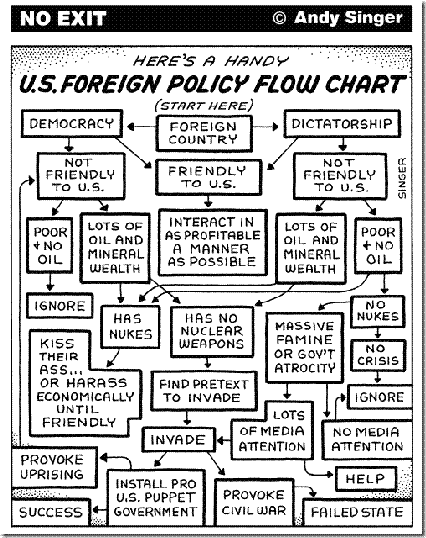
The temptation is overwhelming, in a discussion of this issue, to quote Marx’s famous marginal comment of Feuerbach, that “philosophers have only interpreted the world differently; the point, however, is to change it.” I will not try to resist the temptation; the task that faces the responsible citizen is to work to change the world. But we should not overlook the fact that interpretation and analysis provided by the philosopher, by the intellectual more generally, are essential ingredients in any serious attempt to change the world. If student radicalism often turns to an anti-intellectual direction, the fault in part lies in the deficiencies of scholarship, of our intellectual culture, of the disciplines—such as philosophy—and the institutions—such as the university—that exist only to interpret and advance and defend this culture. Senator Fulbright, in a recent and extremely important speech on the Senate floor, stated that the universities have betrayed a public trust by associating themselves with the government and the corporate system in the military-industrial-academic complex. They have, as he rightly said, largely abandoned the function that they should serve in a free society and have forfeited their right to public support, to a substantial degree, by this retreat—one might say, by this treachery. Only a hypocrite can preach the virtues of non-violence to the Vietnamese or the black community in the United States, while continuing to tolerate the incomparably greater violence to which they are subjected by the society to which he belongs. Similarly, only a hypocrite can condemn the anti-intellectualism of student activists, while tolerating the subversion of scholarship, the impoverishment of intellect, let us be honest—the downright immorality of the academic professions as they support American violence and repression by contributing to weaponry and counterinsurgency, by permitting the social sciences to develop as a technology of control and manipulation, or, more subtly, by helping to create and uphold the system of values that permits us to applaud the pragmatic and responsible attitude shown by those who now oppose the war in Vietnam on grounds of tactics and cost effectiveness. To restore the integrity of intellectual life and cultural values is the most urgent, most crucial task that faces the universities and the professions. Philosophers might take the lead in this effort. If they do not, then they too will have betrayed a responsibility which should be theirs.
– Massachusetts Institute of Technology
Thanksgiving Mannerisms
A happy harvest season to you and yours—courtesy of Giuseppe Arcimboldo (1527 – 1593), the Italian mannerist painter whose eccentric portraiture amused his patrons and enthralled later surrealists like Salvador Dali:

(Autumn from The Four Seasons, oil on canvas. Louvre, Paris.)
Born in Milan, Arcimboldo began painting and designing stained glass windows professionally in his early twenties. He later worked as court portraitist to the Holy Roman Emperors Maximillian II and Rudolf II.
He is remembered for a combination of eccentric, highly sophisticated humor and ingenuity, and meticulous attention to detail. Both of Arcimboldo’s Habsburg patrons as well as King Augustus of Saxony prized his work. He has been influential to later generations of artists, particularly in the 20th Century.
Many of his paintings contain witty symbolism which is frequently lost on modern audiences. While his technique of portraiture is novel to say the least, Arcimboldo was part of a larger trend to weirdness in the Italian mannerist art of the period, encouraged by a variety of prominent patrons.
You can view more of Arcimboldo’s bizzart here, for starters. But—since it is Thanksgiving—I can’t resist throwing in this gem, The Cook (which can also be viewed upside down, as shown):













6 comments